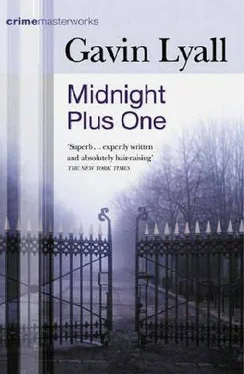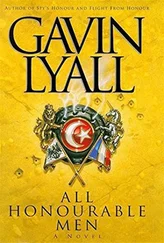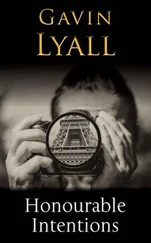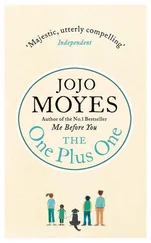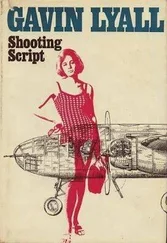There was another silence. Then Ginette unpropped herself from the flowerpot-urn and held out her hand. 'A cigarette, please, Louis.'
I dealt her one and lit one myself. She started to walk slowly down on to the sloping lawn. Miss Jarman hung back, staring at the french windows where Harvey had gone.
'Shouldn't somebody go and – and keep an eye on him?' she asked doubtfully.
I shrugged. 'I'm not stopping you. But that's what he wants: somebody to sit and criticise him, somebody he can blame for something, somebody he can pull a gun on. Somebody to play the enemy. He doesn't want to remember that he's all alone with the enemy.'
'Professor Cane,' she said flatly. 'Your Problems Solved While You Wait.'
'Not solved; just diagnosed. Like the doctor who told the man with rheumatics to get himself turned into a mouse because mice don't have rheumatics, I don't bother with details.'
I could hear the next question whistling down at me like a bomb. I'd just got the direction wrong: it was Ginette who asked it.
'How do you cure him, Louis?'
I took a deep drag on the cigarette. 'You smash his life,' I said slowly. 'You destroy it – his past, his work, everything you can get your hands on. They have a fancier name for it than that, of course – but that's what they do.'
'Why do you need to do that?' Ginette sounded a bit too calm, like a prompter at the edge of the stage. Maybe that's what she was.
'Like you burn a house where you've had the plague in. There's a germ in there somewhere. So you burn everything: furniture, carpets, beds – the lot. It's the same with an alcoholic: something in his life made him a drinker. So, you smash up the life. Maybe, at the end of that, he won't be one any more.'
Miss Jarman said coldly: 'I don't believe it.'
I shrugged and took another drag on the cigarette and pitched it into the laurels.
She said: 'They must know something better than that by now.'
'The miracles of modern medicine, eh? A few years ago, most doctors would have looked on him as a moral failure and told him to snap out of it – and then reckoned they'd done a good day's work. By now they've got this far. They don't yet know what causes it, hi most cases. They just know enough to burn the house down. Progress.'
Ginette said: 'And they call that a cure?'
'No. I'll grant them that – they don't call it a cure. That'd be putting him back to taking a beer at lunch-time, a martini at six o'clock – and able to leave it at that. They can't do that. They just unhook him from the stuff; stop him drinking for ever. But at least they don't call it a cure.'
Miss Jarman said softly: 'Is that all they can do?' Then she turned on Ginette. 'Is that true?'
'My dear child,' Ginette said gravely, 'if I could tell when Louis was telling the truth I might have married him fifteen years ago.'
I gave her a sharp look, then said to the girl: 'But just remember what life you'd be smashing, for Harvey. He's a bodyguard. If he keeps that up, he isn't likely to die in bed, anyway, soberor drunk.'
She pounced. 'Is that his trouble?'
'I don't know. As I said – most times nobody knows the trouble, not unless a man's had deep psychoanalysis. And personally, I'd say that was just another way of burning the house down. But if you want to guess at causes, Harvey's killed a number of men in his time – and he knows he's going to kill more. Not everybody finds that easy to live with. Anyway,' and I resumed my normal level of tact, 'why should you care?'
Her chin came up. 'I like him.'
'You didn't yesterday. You thought we were a couple of Hollywood gangsters.'
'I've changed my mind abouthim.' Then her eyes became worried. 'No, I'm sorry. I was wrong about both of you. But you know him – can't you help him?'
I shook my head. 'I'm part of his old life. Two days ago I didn't know him from Abou Ben Adhem, but I'm still part of it. He connects me with guns; if they have to go, so do I.'
She stood for a moment, arms folded and hugging herself tightly, staying very still and staring sightlessly down the long lawn. Then she suddenly unfolded. 'I'm going back to – to talk to him.' She turned.
I said quickly: 'He knows all this himself. He stayed dry for three days up to now, because he knows he can't mix guns and booze. So he's not fooling himself: he knows the way out. All he needs is a good enough reason to take it Just stopping killing may not be enough.'
'What do you mean?'
'Just why a man becomes an alcoholic doesn't always matter much. Alcohol becomes a cause on its own. So he needs a reason to stop – not just no reason to go on.'
Her eyes searched my face. Then she nodded slowly, and walked away and into the Château.
Ginette watched her go. 'Were you trying to tell her to become his reason, Louis?'
I shrugged. 'Just telling her you don't dry a man out with a couple of church pamphlets and a cup of cocoa.'
'And is it really true, there is no cure?'
'One in a hundred, they say. That many they can send back to normal drinking. But they don't know how or why. Should I have told her that?'
She shook her head thoughtfully. 'No. I do not think she believed you, anyway. She is young enough to believe in miracles. Perhaps even young enough to perform them.' She looked at me. 'And is he one in a hundred, Louis?'
'He's one in several million already. How many people become bodyguards – and as good as he is? He's rated the third best in Paris.' Then I remembered. 'Second best, I suppose now, with Bernard dead.'
She gave me a hard look. 'If he remembers that himself, it may not help him.'
I just nodded. She was right – and it wasn't something Harvey was likely to forget.
She started walking around the edge of the coarse lawn. I dropped into step beside her.
'And where do they rate you nowadays, Louis?'
'I'm not a gunman,' I said coldly.
'Ah – of course. You are a general now. Not just the man who carries the gun. You tell them where to have the gun-fights. Perhaps you think it is not the same battle? – that in the end it will not eat you, too?
'You see,' she said, 'by now I know how gunmen think. That they can never be beatert. Like the fighter pilots. Like the knights in armour, always looking for the next dragon. Always – until the last dragon. And always there is a last. Both Lambert – and you.'
'I'm still not a gunman, Ginette.'
'Neither was Lambert. Did you know how Lambert died?'
'I read in the papers. A sailing accident down near Spain.'
'Did you believe that, Louis?'
I shrugged. It had seemed odd, but I hadn't had anything else to believe.
She went on: 'We kept a boat down near Montpellier -where you and Lambert used to collect the guns they landed from Gibraltar and North Africa, in thefeluccas. And perhaps once a year, he would go out with some old friends, to do a little smuggling. Some tobacco from Tangier, perhaps, or coffee or motor parts for Spain. Not for much profit; just so that he did not grow old too quietly. But one time, the Spanish coastguard was more awake. They machine-gunned the boat. It was most unsporting – but possibly nobody told them he was doing it for the sport?'
I just waved my head meaninglessly.
She said quietly: 'In the newspapers, he was caught in a storm. He was a Comte, of course, and a Resistance hero -so they found a storm for him. It was very kind. But even for him, there was the last dragon.'
After a while, I said: 'I'm not doing this for the sport.'
'Perhaps – but why are you doing it?'
'Because I was hired to do it. It's my job.'
'Whatare you now? You never became a lawyer?'
'No, not in the end. After the war, and then my time with the Paris embassy-'
'You were in the British Secret Service there,' she said, gently reproving. 'We all knew.'
Читать дальше
